Example cartoons and information about ecosystems, species loss, economics, eco-taxation, extinction, business and politics from Eco Freako Environmental Cartoons edition 1.
Ecosystems, wildlife and species loss
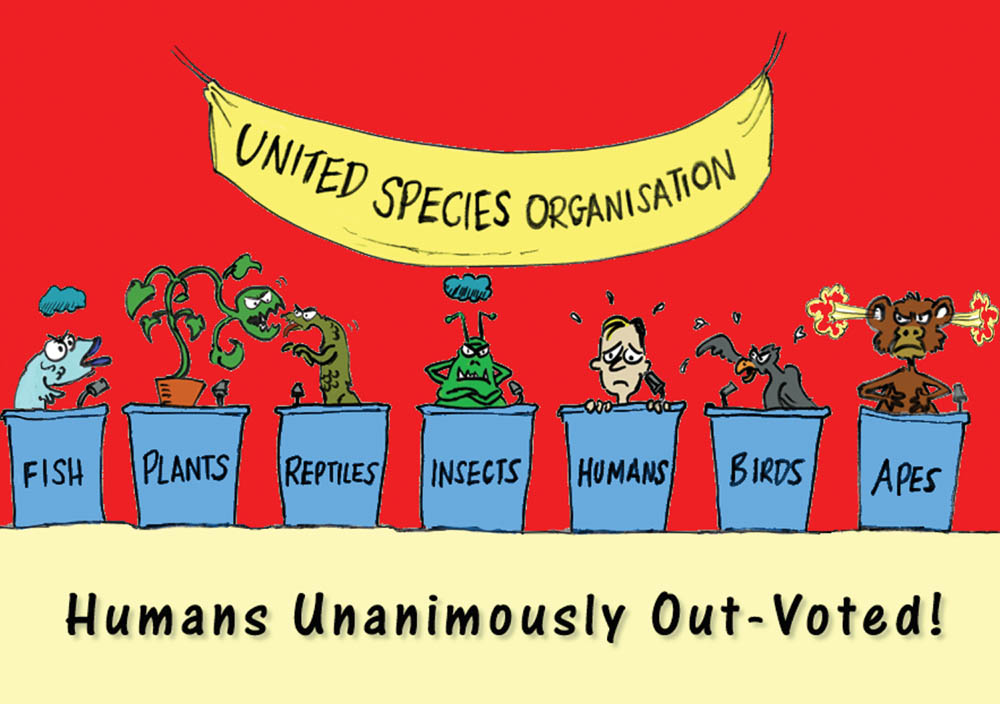
Biodiversity is the variety of life forms we see around us mammals, birds, reptiles, amphibians, fish, insects and other invertebrates, plants, fungi, and micro-organisms such as bacteria and viruses. Maintaining a wide variety of species is significant because our practical needs and values for the future are unpredictable. We have learnt a vast amount from the study of other species, yet we are allowing many to disappear without any knowledge of their existence. It makes sense to preserve as many species and genetic stocks as possible, given that as yet we do not know which are potentially useful as food sources, medicines and materials. Biodiversity is our insurance for the future. Losses are irreversible. Our understanding of ecosystems is so insufficient that we cannot be certain of the impact if any single component is removed. With greater diversity, this enables life to adapt more effectively to changing conditions. It enhances its resilience to cope with ecological stresses. No organism lives in isolation from other living things, and each has its own way of life which contributes to the balance of nature. The inter-dependence and successful functioning of all these parts is a key factor to the healthiness of the planet as a whole. Weak laws and inadequate management has resulted in alarming damage to the habitats and wildlife.
Species are disappearing at rates never witnessed before on Earth. Of the estimated 10 million species believed to inhabit the Earth, only approximately 1.5 million species have been identified. Over the past 25 years, possibly one quarter of life on the planet has been extinguished, and another one third may be extinct by 2050. One species per hour is forced into extinction, and the rate appears to be increasing. The rate at which species are becoming extinct is between 100 to 1000 times more rapid than it was prior to the existence of humankind, and most of this increase is due to human activity. Species loss is primarily due to the destruction of habitats, especially wetlands and tropical forest. Excessive hunting, over-collection and pollution and poisoning by pesticides are also contributing factors. The effects of climate change from greenhouse gases will further accelerate the process of species loss.
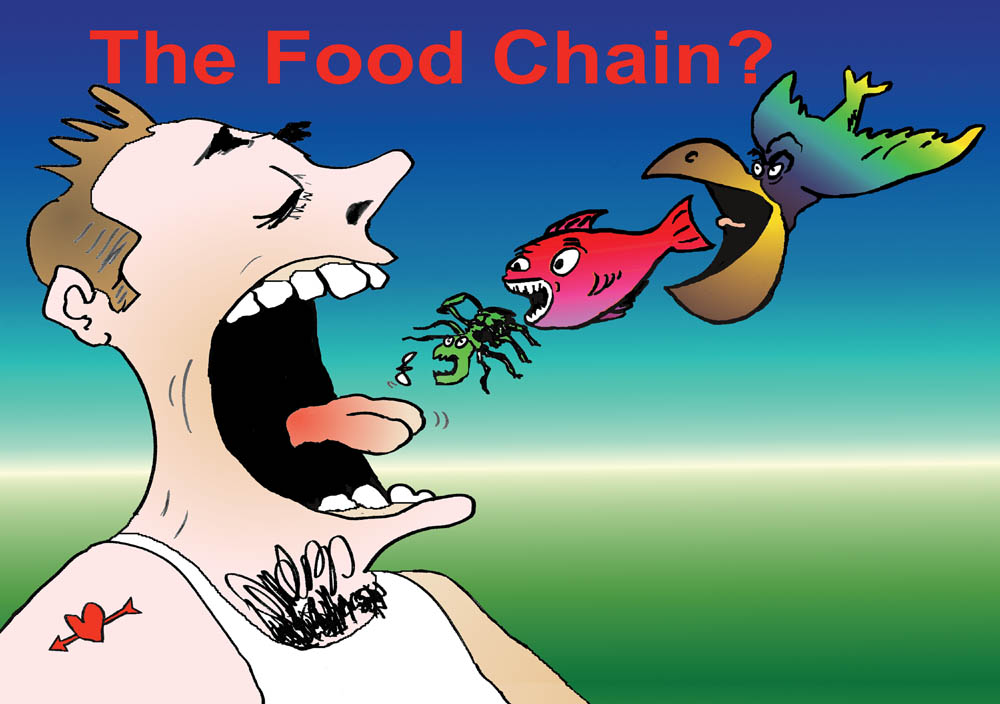
The market in the illegal trade of wildlife and wildlife products is in the millions of dollars each year. At the turn of the twentieth century there were about 100,000 tigers in Asia, and at this time there are only approximately 3200 tigers left in the wild. The Caspian, Balinese and Javan tigers have become extinct in the last 60 years, and the five remaining species that remain are highly endangered. The tiger’s habitat is being cleared for agriculture, cattle ranching, logging and housing. Tigers are a protected species, and trade in tiger products is illegal. Yet the business is so lucrative that for some it is worth the risk of jail or death. Tiger bone and other parts are used in oriental medicines. Tourists and wealthy people overseas buy tiger souvenirs. The African elephant population has decreased by 50% over approximately 30 years, primarily as a result of poaching for the ivory trade. In 1970, there were almost two million African elephants, but by 1989 there were only 600,000 and currently the population is about 400,000. Bears throughout the world are losing their habitat. Many are domesticated, and frequently mistreated and exploited to entertain humans. The use of ocean drift nets up
Economics and eco-taxation
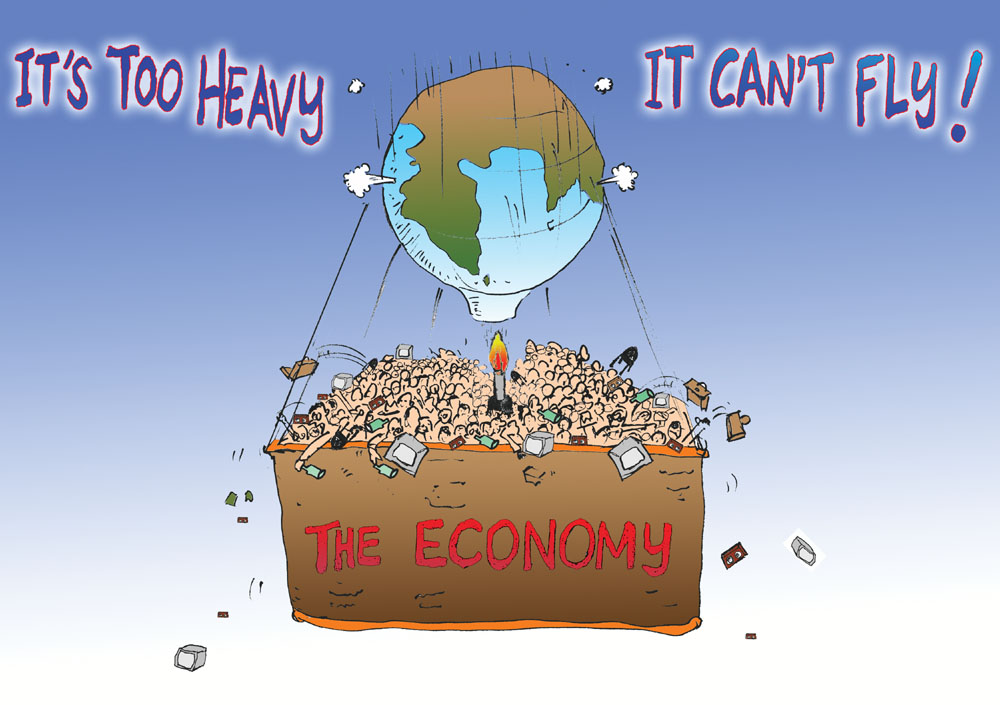
Economics is a social science concerned with the production, distribution, and consumption of goods and services. The term economics comes from the ancient Greek ‘eco’ for house and ‘nomics’ for law or ‘rules of the house’. Similarly ecology means study of the house or environment. The goal of economics is to improve the living conditions of people in society. Taxation is the means by which governments create revenue to pay for services such as education and health, and to persuade people to change their behaviour through incentives or disincentives.
Environmental problems have arisen over the past century because there has been an imbalance between the management of economics and the management of the ecology. Economics has been given greater priority over ecology because of pressure from business for greater profits and from workers for jobs.
Eco-taxation, also known as Green taxation is concerned with taxes that relate directly to the environment. Examples include: emissions tax on motor vehicles to persuade people to purchase greener cars; energy tax to persuade manufacturers to make use of environmentally friendly energy sources such as solar power; pollution taxes, where companies are charged for discharges into the environment that are above an agreed safe limit.
Eco-taxes make people pay for externalities. An externality is a cost incurred in a transaction that actually has no direct effect on either of the parties involved. Consider the situation of a company on the banks of a river. Competition is high, so instead of paying someone to come and take their waste product away, they dump it in the river. The producer and the consumer end up with a cheaper product. The only cost is the polluted river, which neither the seller nor the buyer have to pay for. Eco-taxes are a way to make someone pay for the cost of damaging the environment.
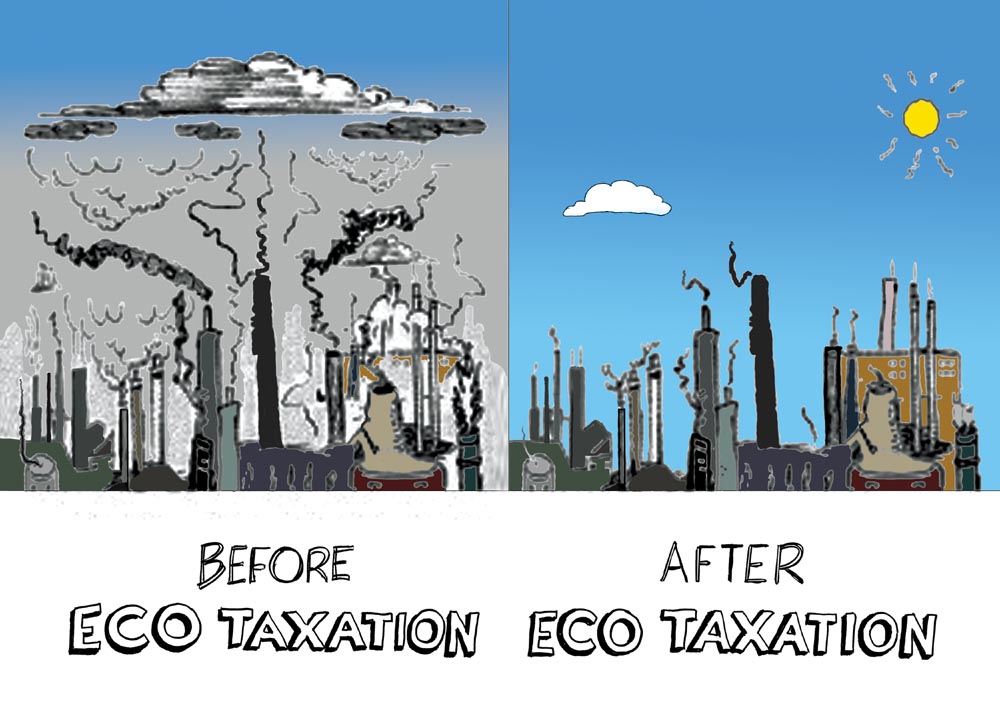
Eco-tax ensures that the true cost of the product is reflected in its selling price. For example, the market price of food will not only include its production but also the costs of pesticides damaging the environment, the loss of soil through erosion and the cost of air pollution from factories in making the end product.
This will make environmentally unfriendly products more expensive, so purchasers are persuaded to invest in alternative technologies, practices and resources that reduce environmental damage. Alternatively, people can be given a price reduction signal, for example the purchase of a car with low exhaust emissions means that the tax paid is reduced.
The aim of eco-tax is to use the funds to resolve the problems for which the tax was created, or be pumped back into the community through areas such as education. Eco-taxes help persuade producers and consumers to change their behaviour so they act in a more environmentally friendly manner and using cleaner manufacturing methods. By placing tax on things such as waste, it can make people treat waste as a resource through which recycling can actually help save money. It also encourages people to be more environmentally active and look for new ways to use energy efficiently or think of innovative ways to recycle waste products. And it helps reinforce environmental regulations by making people observe environmental policies through imposition of financial penalties.
Extinction
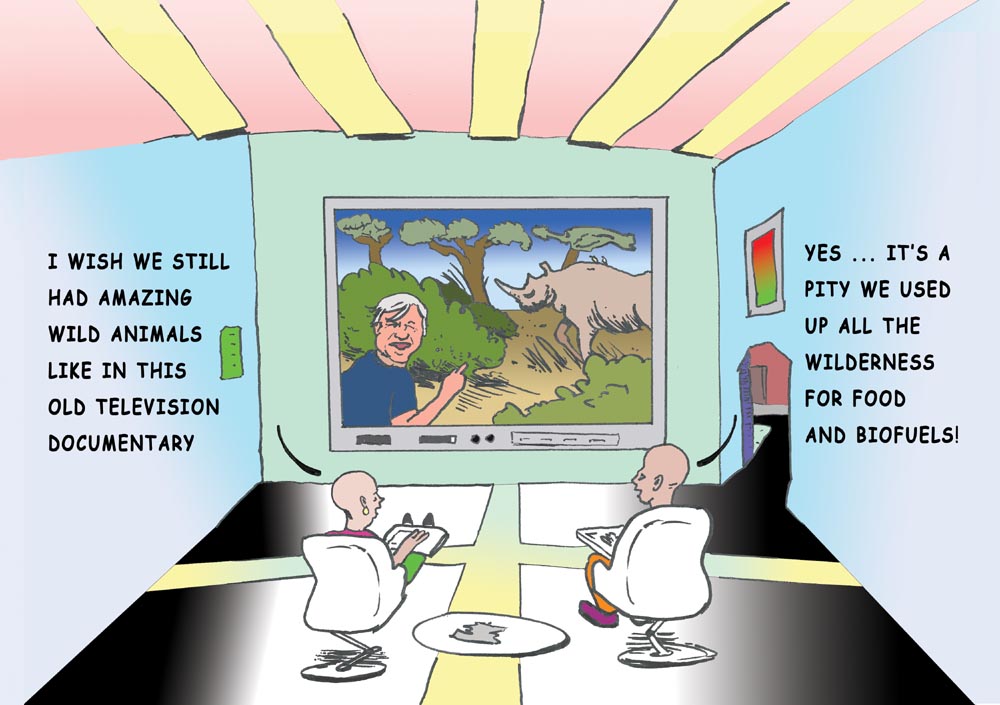
The current mass extinction is sixth mass extinction the Earth has experienced. It began at the end of the Pleistocene with the extinction of large mega-fauna, such as mammoths and sabre-tooth tigers and it has continued right up to the present day. Figures vary but it has been estimated that currently between 30,000 and 500,000 species go extinct annually.
Extinction removes groups of species and in the vacuum that is created new groups appear. The fifth extinction removed the dinosaurs and with the dominant predators gone, mammals seized the opportunity and quickly spread over the planet, specializing, diversifying and growing in size. The conditions that followed from this mass extinction also provided the opportunity for the evolution of Homo sapiens. Modern humans, evolved around 100,000 years ago in Eastern Africa, spread all over the Earth and have come to dominate the Earth over the most recent epoch, known as the Holocene.
Humans began disrupting the environment as soon as they appeared on Earth but increased pressure on the environment when they began migrating out of Africa and spreading throughout the world. Fossil records clearly show that as soon as humans arrived in a new region native species became extinct. Species that had never experienced contact with humans before were probably hunted to extinction. Humans arrived in the Middle East about 90,000 years ago and in Europe 40,000 years ago. The Neanderthals who had been in Europe for about 160,000 years, lived alongside early humans for about another 10,000 years, but then disappeared, either wiped out by warfare or by being unable to compete with humans for food and shelter. Humans arrived in North America about 12,500 years ago and wiped out the mammoths and mastodons. Wherever humans migrated species disappeared.
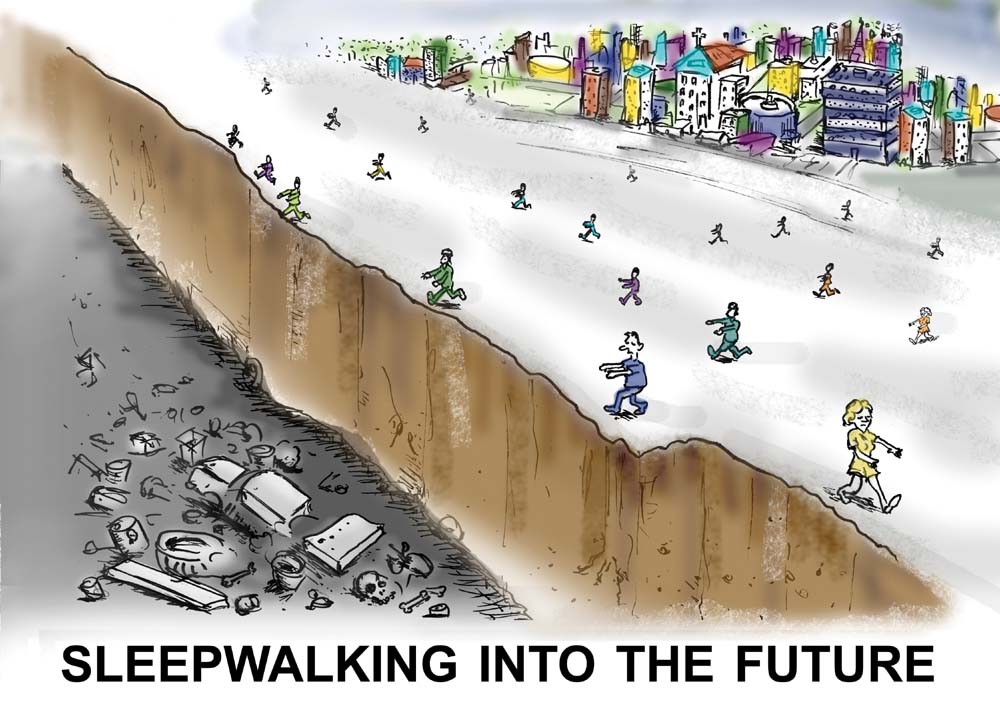
Massive pressure on the environment came about when humans invented agriculture about 10,000 years ago. Agriculture may have been invented in Middle East or in different places but over a short time it spread around the entire globe. The use of agriculture accelerated the pace of the extinction. A natural system only allows a limited number of a given species to inhabit a given area. Agriculture enabled the human population size to expand because it allowed it to exceed the carrying capacity of the local ecosystem. Humans could produce food for immediate use, storage or trade and could overpopulate. By domesticating plants and animals they became the first species to live outside ecosystems. Traditional farming destroys ecosystems. It turns biodiversity into monoculture. It defines native plant and animal species as weeds and pests.
The current mass extinction is different from all previous extinctions because it has a biotic, rather than a physical, cause. Humans are changing the planet and the rate of change is increasing. The process started slowly 100,000 years ago and has been particularly rapid since the industrial revolution 200 years ago. It is caused by human overpopulation, the transmission of invasive species across ecosystems, the spread of agriculture, the transformation of the landscape with urbanisation, overexploitation of species and natural resources and pollution.
The Earth has always recovered after mass extinctions given sufficient time (millions of years) and when the physical cause (ice from an ice age or debris from a meteorite impact) has gone. We are the cause of the sixth extinction. Unless we modify our behaviour the sixth extinction will continue and future generations will inherit a more impoverished and unhealthy planet. The Earth may no longer support us and we may become extinct.
Business and politics
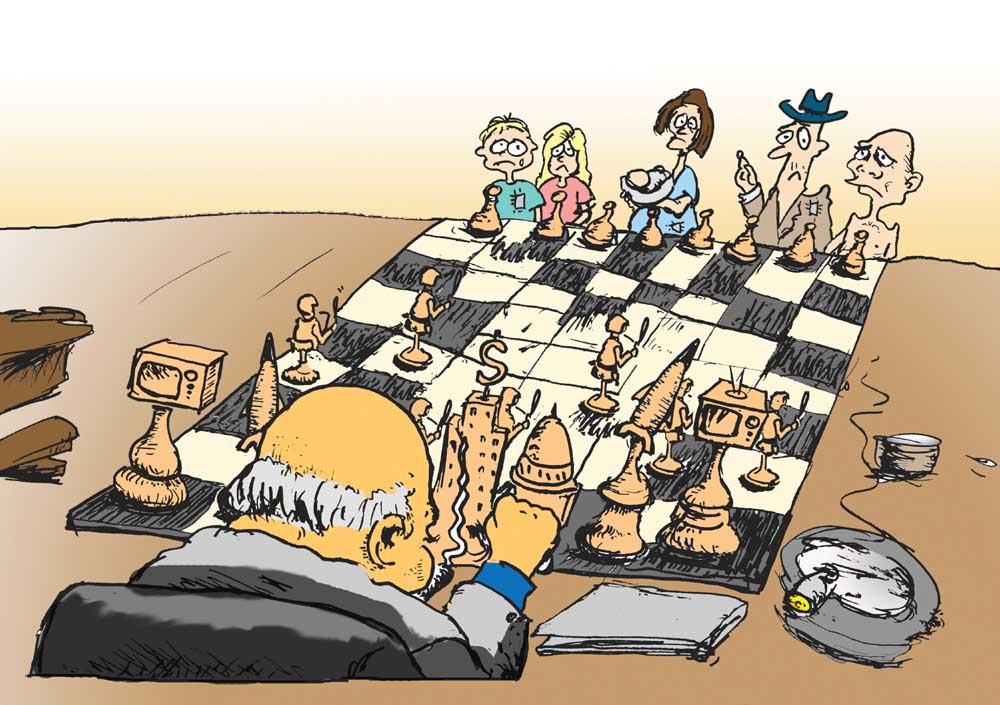
In democracies, people delegate their responsibility for the running of society to the politicians who have the power to make laws and control how a country’s wealth is spent. Politicians manage or mismanage the way a country is run and unless enough people vote for ones who care about the environmental the current level of mismanagement will continue. Most countries do not have true democracy but a dictatorship of two powerful parties. These two parties may be in competition with each other for control of power but their policies are usually very similar and both parties are well funded by multinational companies and wealthy individuals. After winning power these parties are indebted to their rich sponsors who expect favours returned for their large donations. From the well-oiled party machinery of Western countries to the blatant bribe in developing countries, money influences political decisions everywhere in the world.
Washington, Brussels, Ottawa and Canberra are all scenes of intense debate and political lobbying from different power groups. Individuals, corporate, ideological and environmental groups all have offices and infrastructure in these capitals to try and influence the decision makers of the day. The point of a lobby group is to put forward the ideology of its backers and to ensure that legislation favourable to them is put into place. Corporations have the most influence because they have the most money. Industries often pool their resources and set up Industry Associations to influence politicians and bureaucrats, to alter legislation, usually to weaken, block or eliminate proposed public protection legislation, but occasionally to dismantle existing protections or to promote and enact policies and regulations that benefit their bottom line – usually at the expense of the public good, for example to get tax breaks. Election campaigns are usually paid for by key industries. The laws regulating donations and the extent of lobbying varies between countries. In the US and Australia, donations are a more accepted part of the political process, while in the UK and France they are more strictly regulated.
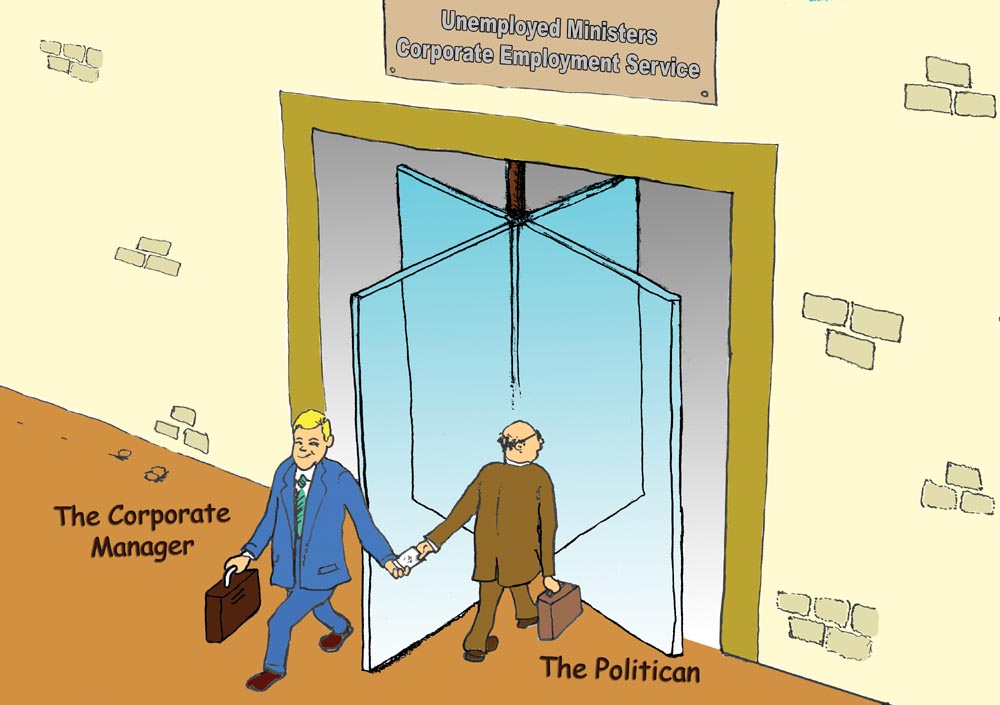
The lobbying industry is massive. Lobbyists are generally either ex-politicians or people connected to politicians such as lawyers or friends or relatives of politicians. Old school networks play a role in connecting lobbyists to politicians in some countries like the UK. Many politicians become lobbyists if they fail to get re-elected. If reselected by the party they may be re-elected to power again at the next election. Analogous to a revolving door many politicians move between positions in government or opposition and high level lobbying positions in corporations as their careers develop. Board members become politicians or are given lucrative diplomatic or government posts, while politicians can anticipate an easy retirement in the corporate sector.
Corporate lobby groups also use ‘think tanks’ to pressure lawmakers. Think tanks are forums of supposed experts who generate reports on various issues and gain publicity for it, resulting from their reputation. Think tanks are comprised of ex-politicians, academics and industry leaders. They are financed by corporations, individuals and NGOs who hope to give more credibility to their ideas.
One of the major problems of capitalism is that it allows wealth and hence power to be consolidated in the hands of a few. In a democratic society everyone has an equal vote but not everyone has an equal opportunity of being heard or being able to influence his or her politicians. The corporations have too much wealth and power and, as a general rule, they use that power to accumulate even more wealth and power.